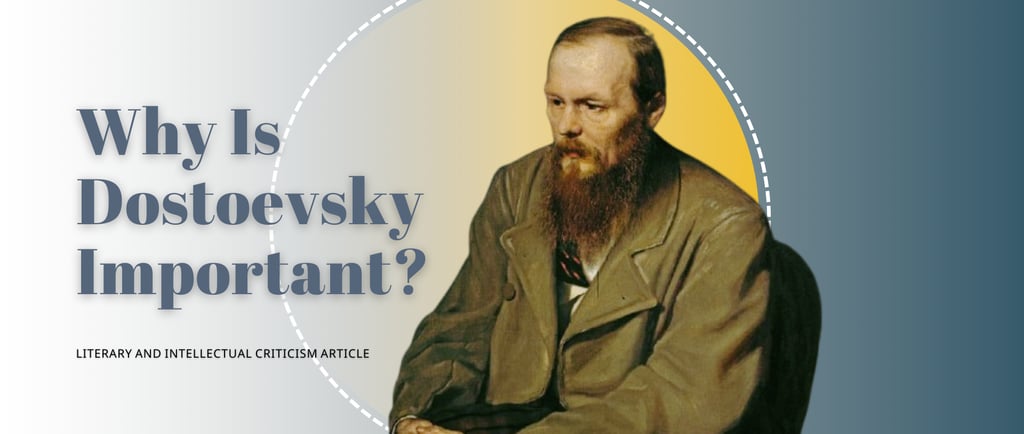Why Is Dostoevsky Important?
Literary and Intellectual Criticism Article
By Omar Alsheikh
1/7/2022



Why Is Dostoevsky Important?
Few authors in the history of world literature have captured the full spectrum of human emotion and moral conflict quite as vividly and expansively as Fyodor Dostoevsky (1821–1881). Emerging from a Russia on the cusp of profound social and political change, Dostoevsky immersed himself in the turbulent undercurrents of his era: financial hardship, personal loss, political ferment, and the stifling burdens of exile. Despite—and perhaps because of—these trials, he fashioned literary works that delve fearlessly into the dark corridors of human consciousness. On every page, we sense a writer wrestling with urgent existential questions: How can the individual find redemption amid cruelty and despair? Do faith and reason necessarily collide, or can they reconcile to illuminate a greater truth? More than a century after his death, these enduring concerns ensure Dostoevsky’s continued resonance and underscore his essential place in the pantheon of world literature.
In what follows, we will examine three critical dimensions of Dostoevsky’s work: the personal experiences that fueled his creative passions, the innovative narrative techniques that revolutionized the modern novel, and the philosophical themes that underpin his timeless relevance. By situating him within these broad contexts, we can better grasp why Dostoevsky’s vision remains so influential—and so necessary—in our ongoing quest to understand the human condition.
From Near-Execution to Unshakable Vision
Dostoevsky’s biography is as dramatic as the plots of his novels, and the defining moment of that drama arrived in 1849. At the age of twenty-seven, he was arrested on charges of participating in a politically subversive reading group, which the czarist regime regarded as dangerously radical. After months of confinement and interrogation, Dostoevsky was sentenced to death by firing squad. Hauled out into the bleak Russian cold, bound, and blindfolded, he awaited the rifle shots that would, he believed, end his life. In a last-minute twist, however, the order was rescinded: his death sentence was commuted to exile and penal servitude in Siberia. This event, sometimes referred to as the “mock execution,” had a seismic impact on his outlook.
In subsequent letters and reflections, Dostoevsky described how this brush with death amplified his sense of life’s fragility and sanctity. His entire worldview pivoted upon the realization that, were the clock to stop abruptly, a single moment would bear infinite significance. The existential gravity of that episode reverberated through his literary career. Novels like Crime and Punishment (1866) exemplify a profound concern with sin, guilt, and the potential for moral regeneration—a thematic arc intimately connected to his personal experience of being spared at the final hour.
Upon returning from Siberian exile, Dostoevsky struggled to rebuild his life against a backdrop of further political upheavals and personal losses, including the death of his first wife and the burdens of chronic financial instability. Yet these hardships proved fertile soil for his literary imagination. They galvanized his belief that empathy and compassion could serve as bulwarks against the forces of alienation and despair. This conviction took narrative form in characters who, despite committing grave misdeeds, are granted pathways—if fraught ones—toward redemption. Moreover, the evangelical strain that runs through his later writings, particularly in The Brothers Karamazov (1880), owes a great deal to the combination of spiritual searching and emotional extremities that defined his exile years.
The Polyphonic Craft: Dostoevsky’s Narrative Architecture
One of Dostoevsky’s most significant contributions to literary history lies in his narrative style, often described as “polyphonic.” The Russian literary theorist Mikhail Bakhtin famously adopted the term to illustrate how Dostoevsky’s novels contain a chorus of independent voices—each with its own moral and philosophical stance—coexisting, clashing, and evolving throughout the text. Rather than subordinating these perspectives under a single “authorial truth,” Dostoevsky gives each viewpoint a space to articulate its own reasoning and emotional force.
This method is crucial to the dynamism of works like The Idiot (1868) and Demons (also known as The Possessed, 1872). In The Idiot, Prince Myshkin embodies radical goodness, thrown into an aristocratic society rife with cynicism and self-interest. Yet the novel refuses to offer a neat resolution between Myshkin’s seemingly naive idealism and the worldly machinations that attempt to ensnare him. Characters debate, contradict, and even undermine each other, leaving readers to grapple with ethical paradoxes rather than accept a single moral conclusion. By weaving competing ideologies into the same narrative, Dostoevsky effectively stages a laboratory of the human psyche, where concepts like Christian humility, nihilistic rebellion, and societal hypocrisy collide in dramatic fashion.
In addition to highlighting diverse moral stances, this polyphonic style amplifies the psychological tension at the core of Dostoevsky’s fiction. Driven by dialogue and interior monologues, his novels focus intensely on the inner torment of characters. Readers witness the elaborate justifications that lead to crimes, the pangs of conscience that follow, and the sometimes miraculous transformations that spiritual epiphanies can induce. This narrative architecture, marked by layered viewpoints and existential questioning, elevates Dostoevsky’s works from mere storytelling to ethical inquiry in novelistic form.
Existential Underpinnings and Ongoing Legacy
Dostoevsky’s exploration of moral psychology, freedom, and faith positioned him as a forerunner of existential philosophy, later articulated by thinkers such as Friedrich Nietzsche, Jean-Paul Sartre, and Albert Camus. While the literary world of 19th-century Russia may appear distant from modern debates about authenticity and absurdity, Dostoevsky’s characters face dilemmas that resonate powerfully in contemporary contexts. Raskolnikov’s dilemma in Crime and Punishment—killing to affirm a twisted moral theory only to confront unshakable guilt—prefigures the 20th-century existential emphasis on individual choice and the weight of responsibility. Similarly, Ivan Karamazov’s anguished arguments in The Brothers Karamazov over the suffering of children and the justification of divine justice remain potent reflections on the problem of evil.
Crucially, Dostoevsky does not impose easy answers or embrace a one-size-fits-all doctrine. Instead, he shows that human existence is riven by paradoxes: we yearn for God but doubt His presence, we crave freedom yet often buckle under the loneliness it brings, and we carry both love and cruelty within us. For Dostoevsky, the ultimate question is whether these contradictions can find resolution in compassion, faith, or some combination thereof. His insights continue to speak to moral philosophers, psychologists, theologians, and ordinary readers who sense that the “why” of human suffering and redemption cannot be boiled down to simple formulas.
Beyond the realm of ideas, Dostoevsky’s influence on subsequent literature is immense. Novelists from Franz Kafka to Thomas Mann, and from Ralph Ellison to J. M. Coetzee, have all echoed Dostoevsky’s approach of blending introspective psychology with broader social critique. His capacity to depict feverish inner monologues alongside sweeping spiritual dilemmas remains a benchmark for novels that probe the depths of human motivation. In many respects, Dostoevsky’s novels form a dialogue with readers across time, inviting each new generation to confront the abiding questions of morality and belief.
So, Why Is Dostoevsky Important?
He endures because he probed humanity’s most unsettling mysteries—guilt, salvation, freedom, and our insatiable longing for moral certainty—and he did so without shirking the complexity of these issues. His protagonists, flawed and achingly real, illuminate the inner battles that define our collective experience. Whether it is Raskolnikov’s wrestling with conscience or Ivan Karamazov’s despair at the injustice of the universe, we encounter reflections of our own struggles to find meaning in a fractured world. Dostoevsky’s willingness to confront the darkest corners of human nature with empathy and philosophical depth transforms his novels into timeless investigations of what it means to be fully, irreducibly human. Through his polyphonic narratives and his unvarnished depictions of sin and redemption, he continues to stand as a guiding force in literature and thought—a beacon of artistic boldness and unflinching moral inquiry.
